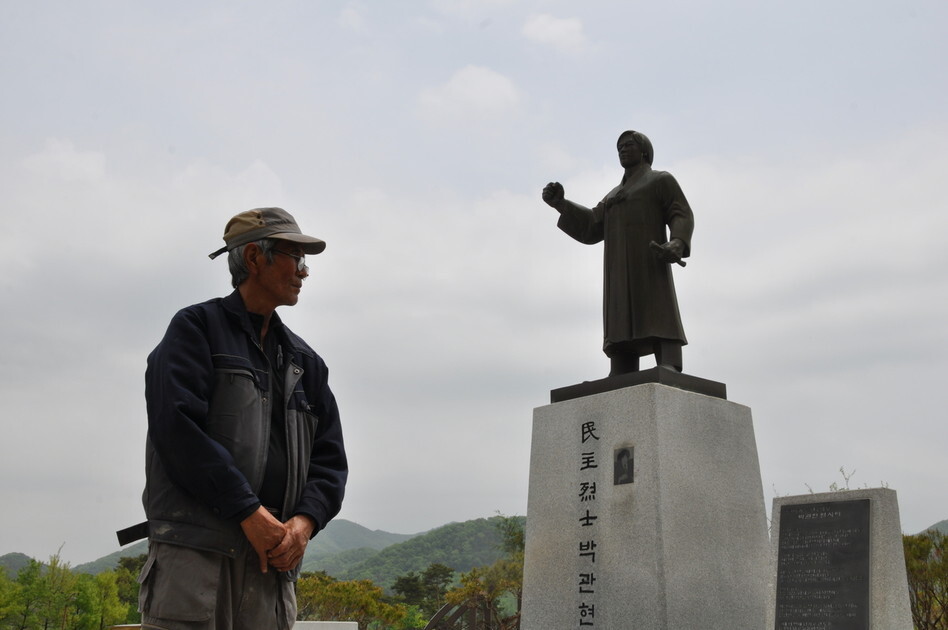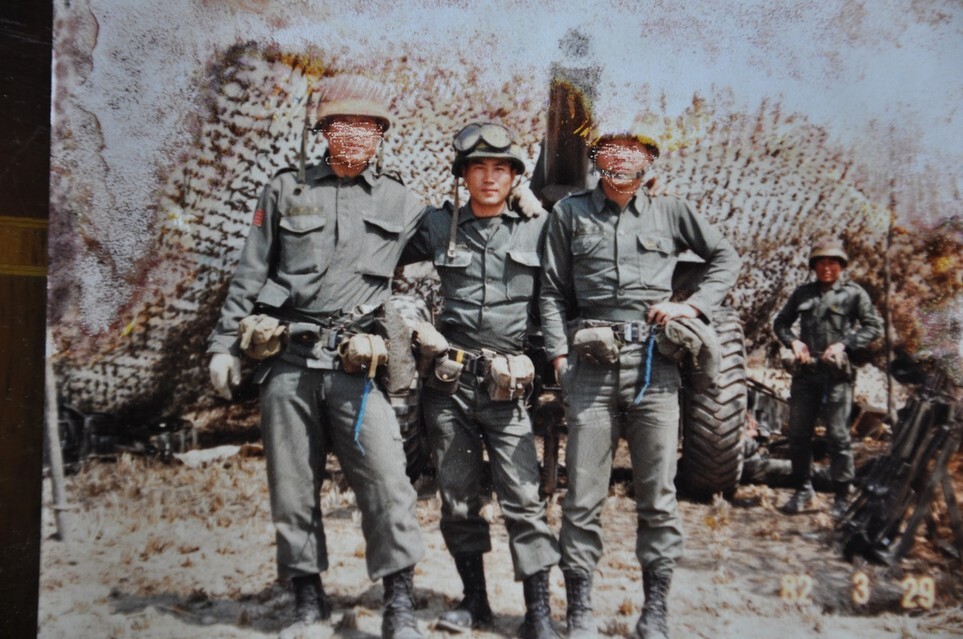hankyoreh
Links to other country sites 다른 나라 사이트 링크
[Interview] A life of shame and regret

“I should’ve just deserted. [. . .] My life would not have been utterly ruined.”
Jeong Hyeon-su, now 62, was one of 20,000 martial law troops mobilized on May 27, 1980, in an operation to suppress the participants in the Gwangju Democratization Movement in front of the South Jeolla Provincial Office. At the time, he was a driver with the 91st Battalion of the 20th Division’s 60th Regiment. Following the martial law decree, the 22-year-old had been stationed at Kyung Hee University; he was sent to Gwangju shortly after troops opened fire in front of the provincial office.
“I boarded a transport aircraft for the first time in my life at Seongnam Air Base [in Gyeonggi Province]. Just before boarding, we were given 280 rounds of ammunition and two tear gas grenades,” he recalled.
“I thought there must be some kind of war on. None of the platoon members knew where we were going.”
On their arrival, it turned out to be Gwangju. A native of Yeonggwang in South Jeolla, Jeong had worked as a driver in Gwangju before enlisting, so he was familiar with the roads outside of the airfield. Early on the morning of May 27, they set out for central Gwangju, disembarking in front of the Army Gymnasium building (Sangmugwan). There, he saw 20 to 30 dead bodies covered in straw sacks. He could not help turning his head away from the grisly sight. While carrying out his guard operations between Geumnam Road and Gwangju Stream, he bore witness to hideous carnage.
“In front of the Central Theater of Geumnam Road No. 4, there was the body of a woman in her 40s who’d been stabbed in the stomach and chest. The wind had blown away the sack she’d been covered up with, and you could see her upper body. It kept preying on me how they hadn’t cleared her away.”
While patrolling with his unit, he saw five or six additional bodies in front of the police outpost in the Hwanggeum neighborhood. The memory still makes his heart race, but the other troops who were with him seemed unfazed as they rigorously searched each passerby. They also physically searched women -- including nurses and telephone operators -- and searched their handbags on the grounds that “the telephones have been shut off and agents are communicating with each other through written notes.”
“I’ll never forget that cold look in their eyes when they saw us. I was afraid I might run into someone who recognized me. I felt so uncomfortable wearing my uniform.”
Jeong did not fire a single bullet in Gwangju that May. He did not even strike anyone -- yet the trauma has tormented him ever since. Seeing residents around his unit waving the South Korean flag to welcome the returning soldiers, he thought, “What are they doing that for? We didn’t do anything good.” Within his unit, he was ostracized and bullied for the compassionate attitude he had shown in Gwangju.
After being discharged in 1982, Jeong became a truck driver in Gwangju’s Gwangsan District. Work was plentiful, and he eventually married and started a family. The memories of his mobilization that day seemed to have faded into history.

“One day, I was turning in the traffic circle in front of South Jeolla Provincial Office, and all of a sudden, the images came back to me,” he said. “Driving past the Central Theater on Geumnam Road or near Ildeung Inn in the Sugi neighborhood, I could remember everything that had happened.”
Jeong could not stand working on such days. He began drinking more and more to forget. Eventually, he could no longer get to sleep without drinking. In the 1990s, he saw a television program on the guilt experienced by soldiers who had been in Gwangju at the time. He called up the network during the live broadcast and recounted what he had witnessed. He gave his name and affiliation -- which may have explained why intelligence agents dressed in suits began appearing near his house. Jeong immediately moved to Seoul, sold off his old truck, purchased a new one with a Gyeonggi Province license plate, and began working back and forth between Gangwon Province and Busan. He returned to Gwangju a few months later, but the loneliness led to more drinking, while the drinking only brought more loneliness. Eventually, his family left him.
“Am I not right in the head? I did go to a psychiatrist. I took medication for a week, and I never went again.”
A few years ago, he watched the film “A Taxi Driver.” Having spent his life as a driver, he felt bitterly ashamed to see the protagonist putting his life on the line.
These days, it takes Jeong four sleeping pills just to fall asleep when May arrives. He sometimes visits a statue of Park Gwan-hyeon -- the president of the Chonnam National University student council in 1980 -- three kilometers from his house. As a gesture of atonement, he pours out some soju onto the ground and pulls weeds growing in front of the memorial.
“For a while, I just felt sorry for myself. Now I’ve accepted it. You have to live your life and atone for what you’ve done. I want to share everything I saw and start rebuilding my shattered life.”
By Ahn Kwan-ok, Gwangju correspondent
Please direct comments or questions to [english@hani.co.kr]

Editorial・opinion
![[Guest essay] Preventing Korean Peninsula from becoming front line of new cold war [Guest essay] Preventing Korean Peninsula from becoming front line of new cold war](https://flexible.img.hani.co.kr/flexible/normal/500/300/imgdb/original/2024/0507/7217150679227807.jpg) [Guest essay] Preventing Korean Peninsula from becoming front line of new cold war
[Guest essay] Preventing Korean Peninsula from becoming front line of new cold war![[Column] The state is back — but is it in business? [Column] The state is back — but is it in business?](https://flexible.img.hani.co.kr/flexible/normal/500/300/imgdb/original/2024/0506/8217149564092725.jpg) [Column] The state is back — but is it in business?
[Column] The state is back — but is it in business?- [Column] Life on our Trisolaris
- [Editorial] Penalties for airing allegations against Korea’s first lady endanger free press
- [Editorial] Yoon must halt procurement of SM-3 interceptor missiles
- [Guest essay] Maybe Korea’s rapid population decline is an opportunity, not a crisis
- [Column] Can Yoon steer diplomacy with Russia, China back on track?
- [Column] Season 2 of special prosecutor probe may be coming to Korea soon
- [Column] Park Geun-hye déjà vu in Yoon Suk-yeol
- [Editorial] New weight of N. Korea’s nuclear threats makes dialogue all the more urgent
Most viewed articles
- 1[Guest essay] Preventing Korean Peninsula from becoming front line of new cold war
- 2After 2 years in office, Yoon’s promises of fairness, common sense ring hollow
- 360% of young Koreans see no need to have kids after marriage
- 4Yoon’s broken-compass diplomacy is steering Korea into serving US, Japanese interests
- 5[Column] Why Korea’s hard right is fated to lose
- 6S. Korean first lady likely to face questioning by prosecutors over Dior handbag scandal
- 7[News analysis] Jo Song-gil’s defection and its potential impact on inter-Korean relations
- 811 years after US decamped, military base in Busan still festering with pollution
- 9[Editorial] The ideals of the Korean Provisional Government are still threatened today
- 10[Column] “Hoesik” as ritual of hierarchical obedience